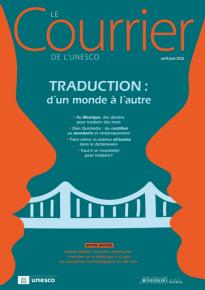فكرة
فينيرا توكتوروفا، مسار مهاجرة قيرغيزية

عند وصولها إلى موسكو منذ 13 سنة خلت، عرفت فينيرا توكتوروفا، في البداية، نفس مصير المهاجرين القرغيزيين من مراكمة للوظائف الشاقة منخفضة الأجر. وهي اليوم صاحبة مَطعميْن إلى جانب بعثها لسينما "ماناس"، القاعة القرغيزية الوحيدة في المدينة.
نازيجول جوسوبوفا
صحفية قيرغيزية مقيمة في موسكو (اتحاد روسيا)
وسط مقهى صاخب شرقي موسكو، تغمره موسيقى شرقية ويعرف بسليمان-تو، تراقب امرأة، بكثير من الحزم، تحرّكات النوادل انطلاقا من الجزء الخلفي من القاعة، وعينها على هاتفها الجوال. إنّها فينيرا توكتوروفا، صاحبة المكان، تنتصب في فستانها الفاتح اللون وشعرها المشدود برصانة، وقد بلغت الأربعين من العمر.
منذ 13 سنة خلت، غادرت، إثر طلاقها، بلدة أوش الصغيرة في قيرغيزستان، لتستقرّ في العاصمة الروسية مع ابنتها البالغة من العمر ثلاث سنوات. كانت تفتقد إلى أدنى مورد وليس لديها مكان تذهب إليه، لكن لا شيء يُحبط عزيمتها، وهي التي باعت، عندما كانت صغيرة، العلك والسجائر في البازار المحلي بعد انتهاء حصّة الدرس لمساعدة أسرتها.
كان بإمكانها أن تصبح مُدرّسة في بلادها بعد حصولها على شهادة في الاقتصاد، لكنّها تقول: "أتصوّر إلى أيّ حدّ كانت الحياة ستكون صعبة براتب يكاد يغطي النفقات الأساسية". فمتوسّط الرّاتب في قيرغيزستان يبلغ حوالي 200 دولار شهريًا، وهو الأدنى بين دول المنطقة. وكانت روسيا تعدّ، في سنة 2019، مليون مهاجر قدموا من قيرغيزستان.
عند وصولها إلى موسكو، عرفت المسار التقليدي للمهاجرين القادمين من هذا البلد الواقع في آسيا الوسطى. فهي تتذكّر كيف كانت تسكن قبوا مع ابنتها: "في تلك الفترة، كان [القرغيزيون]، يُشغَّلون عادة كعمال نظافة ويعيشون في الأقبية". في البداية، اشتغلت بوّابة في عمارة فخمة، ثم راكمت وظائف عاملة تنظيف لتمويل تعليم ابنتها، واختارت أن ترفض وظائف ذات أجور أعلى حتى لا تضطرّ إلى إيداع طفلتها لدى مربّية تعتني بها. تقول فينيرا: "كان من المهمّ بالنسبة لي أن أراها تكبر أمامي".
قوة الأحلام
بفضل المداومة على العمل الشاق، تمكّنت في سنة واحدة من توفير ما يكفي من المال لشراء شقة صغيرة في أوش، مسقط رأسها. "كنت أستيقظ عند الفجر لترتيب بيت مُشغّلي الأول، ثم أصطحب ابنتي إلى المدرسة وأعود إلى العمل قبل أن أذهب من جديد لجلبها من المدرسة. وعندما تنام، أذهب لتنظيف الأرضيّة لدى مُشغّل آخر. كنت مثل الهامستر داخل قفصه الدائري".
إلى جانب تحمّلها المشاق، كانت فينيرا حاملة لحلم بحياة أكثر رفاهة تكون فيه مالكة لمكان خاص بها. وهي لم تتزوّج ثانية وتقول: "اليوم أملك شقتي الخاصة في موسكو ولديّ تلفزيون بشاشة كبيرة. وهو دليل على أن الأحلام يمكن أن تتحقّق!".
مع مرّ السنين، ما فتئ أفق العودة إلى الوطن يبتعد. فالرّغبة في ضمان حصول ابنتها على تعليم جيد، والحرص على نجاحها الشخصي جعلاها تؤجّل هذه العودة باستمرار. إذ تضيف: "غادرتُ موسكو أكثر من مرّة وأنا مقرّة العزم على عدم العودة إليها، لكنني كنت أعود في كلّ مرّة".
والحقيقة إنها قطعت شوطًا طويلاً منذ قدومها إلى موسكو، فقد أصبحت الآن صاحبة أعمال بالكامل إذ تملك، بالشّراكة، مطعمين. ورغم استقرارها بالعاصمة الروسية، فهي لم تقطع الصلة مع بلادها الأصلية.
ومنذ ثلاث سنوات، فتحت مع العديد من الشركاء قاعة السينما القرغيزية الوحيدة في موسكو. غير أن قلّة التجربة والأخطاء في التصرّف الإداري سرعان ما أجهضا هذه المبادرة. بيد أنّ تلك الأشهر القليلة من حياة سينما "ماناس"، وهو اسم لملحمة قرغيزية شهيرة، كانت كافية لخلق الحاجة لدى مواطنيها الذين قاموا بحملة نشيطة لإعادة فتحها.
وها أن "ماناس" تُصبح اليوم واحدا من الأماكن الثقافية القرغيزية الرئيسية في المدينة، حيث يأتيها مواطنو هذه الدولة الواقعة في آسيا الوسطى بحثا عن الترفيه، واستجابة لنداء الحنين إلى الوطن. وكثيرون هم من يعترفون لفينيرا بأنهم يستمتعون بمشاهدة الأفلام القرغيزية في المهجر أكثر ممّا لو شاهدوها في ديارهم. وعند مغادرتهم، يشكرونها دائمًا على إتاحة الفرصة لهم لمشاهدة أفلام تنطق بلغتهم وتثير فيهم ذكرى الأماكن التي عرفوها أيّام طفولتهم.
نهضة السينما القيرغيزية
منذ بضع سنوات، اكتسبت السينما القرغيزية حيوية جديدة. وقد بلغ الفنّ السّابع المحلّي أوجَه في السبعينيات التي تُعدّ فترة "المعجزة القرغيزية". فقد أخرج سينمائيون أعمال الكاتب تشينجيز آيتماتوف إلى الشاشة الكبيرة. لكن الإنتاج السينمائي حُرم من الدّعم بعد استقلال قيرغيزستان وعرف ركودًا. واليوم، ظهر جيل جديد من السينمائيين ونقل إلى الشّاشة مشاريع تجارية عرفت طريقها إلى الجمهور، ومكّنت الأفلام القرغيزية من نحت مكانتها إلى جانب الإنتاجات الأجنبية.
في عام 2018، بمناسبة الذكرى التّسعين لميلاد تشينجيز آيتماتوف، أهدت سفارة قيرغيزستان في روسيا إلى قاعة السينما مجموعة من الأفلام المقتبسة من أعمال هذا الكاتب. هكذا تمكّنت "ماناس"، طيلة سنة كاملة، من برمجة أفلام قيرغيزية من "العصر الذهبي" مجانًا. تقول فينيرا بكثير من الابتهاج: "لقد كانت هديّة رائعة !»، مُعترفة بأنّها اكتشفت، على نحو متأخّر، ثراء السينما القرغيزية.
بعد 13 سنة من مغادرتها بلدها، تفكّر فينيرا في إمكانية البقاء في موسكو لبضع سنوات أخرى. "هنا، كان عليّ أن أتحمّل قساوة الشّغل وأن أتغلّب على الصعوبات، لكنّني كنت أشعر بالانشراح في حياتي الجديدة. لقد تعلّمت التّفكير بشكل مختلف وأصبحت أقوى". ومع ذلك، فإنها لم تتخلّ أبدًا عن الأمل في العودة يومًا ما للعيش في بلادها الأصلية. "مهما كان مستوى تعليمنا ومدى نجاحنا، فنحن المهاجرون يبقى لدينا دائمًا شعور خاص بأننا قادمون من مكان آخر."
قراءات ذات صلة
روائع اللّغة بقلم تشينجيز آيتماتوف، رسالة اليونسكو، يوليو 1982
سامال يسلياموفا وسرغاي دفورتسيفوي: لمّا تكون السينما مرآة للواقع، رسالة اليونسكو، يناير - مارس 2020
اشترك في رسالة اليونسكو لمتابعة الأحداث. الاشتراك في النسخة الرقمية مجاني %100.
Nazigul Jusupova
Kyrgyz journalist, based in Moscow.
In a lively café filled with Asian music in Moscow’s east, a woman watches the comings and goings of the servers with an authoritative eye, while checking her mobile phone from time to time. Wearing a light-coloured dress and her hair neatly tied back, Venera Toktorova, 40, is the owner of the Sulaiman-Too – named after the sacred mountain of her homeland.
Thirteen years ago, Toktorova left the small town of Osh in Kyrgyzstan after a divorce, and moved to the Russian capital with her three-year-old daughter. She was destitute at the time, and had nowhere to go. But nothing daunted the determination of this woman who, as a child, had sold chewing gum and cigarettes at the local bazaar after school to help support her family.
With a degree in economics, she could have become a teacher in her country. “I can imagine how difficult life would have been, with a salary that barely covered basic expenses,” she says. The average salary in Kyrgyzstan is about $200 a month – the lowest among countries in the region. In 2019, there were more than 1 million migrants from Kyrgyzstan in Russia.
When she arrived in Moscow, she followed the path that is typical for migrants from this Central Asian country. “At that time, they were usually employed as maintenance workers and lived in basements,” recalls Toktorova, who initially lived in a basement with her daughter. At first, she worked as a janitor in a posh building, and then as a house cleaner, to pay for her daughter's schooling. She chose to turn down better-paying jobs that would have forced her to leave her child with a nanny. “It was important for me to see her grow up,” she explains.
The power of dreams
Through sheer hard work, she managed to save enough money in a year to buy a small apartment in Osh. “I used to get up at dawn to clean for my first employer, I would then take my daughter to school, and go back to work. Then I would leave to pick up my daughter, and when she was in bed, I would go to another employer to clean the floor. I felt like a hamster on a wheel,” she remembers.
Besides working hard, Toktorova, who has not remarried, was also driven by a dream – she imagined a more comfortable life for herself, and a place to call her own. “Today I have my own apartment in Moscow, and a big TV screen. This is proof that dreams do come true!” she enthuses.
Over the years, the idea of returning to Kyrgyzstan has faded. The desire to provide her daughter with a quality education, and her own success, have led Toktorova to keep postponing her wish to return. “I left Moscow so many times telling myself that I would never return, but each time I came back,” she admits.
She has certainly come a long way since her arrival. Now an accomplished entrepreneur, Toktorova co-owns two restaurants. But though she has settled in Moscow, she has not severed her ties to the country of her birth.
Three years ago, Toktorova started the only Kyrgyz cinema hall in the Russian capital, with several partners. A lack of experience and management errors quickly led to the failure of this venture. However, the few months that the Manas cinema existed were enough to create a need among her compatriots – who actively campaigned for its reopening.
Named after a famous Kyrgyz epic, Manas Cinemas is today one of Moscow’s main Kyrgyz cultural attractions. People from Kyrgyzstan come here to be entertained, but just as much to cure their homesickness. Many confess to Toktorova that they enjoy watching Kyrgyz films abroad more than they did at home. When they leave, they always thank her for giving them the opportunity to see a film in their own language, and in the setting of their childhood.
Manas Cinemas is one of the capital’s main Kyrgyz cultural attractions today
A renaissance of Kyrgyz cinema
In recent years, Kyrgyz cinema has gained a new vitality. The seventh art had reached its peak locally in the 1970s. This was the time of the “Kyrgyz miracle”, when young directors adapted the works of the writer Chingiz Aïtmatov (1928-2008) for the big screen. But after Kyrgyzstan became an independent country in 1991, the film industry was deprived of subsidies and went through a period of decline.
Today, a new generation of filmmakers has emerged, bringing commercially viable projects to the big screen that have found their audience. As a result, Kyrgyz films have found their place alongside international productions.
In 2018, on the occasion of the 90th anniversary of Aïtmatov's birth, the Kyrgyz embassy in Russia gifted a collection of films adapted from his works to Manas. This allowed the film theatre to programme Kyrgyz films from the “Golden Age” free of charge for an entire year. “It was a wonderful gift,” says Toktorova, admitting that she only recently discovered the richness of Kyrgyz cinema.
Thirteen years after leaving Kyrgyzstan, the successful entrepreneur says she can imagine herself living in Moscow for a few more years. “Here I’ve had to work hard and overcome difficulties, but I’ve blossomed in this new life. I’ve learned to think differently, and I’ve become stronger.”
In Moscow, I’ve had to work hard, but I’ve blossomed in this new life
Still, Toktorova has never quite given up the hope that she will return to live in her homeland one day. “No matter how educated or how successful we are, we migrants always have the strong feeling of being from somewhere else.”

In the same issue








